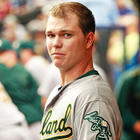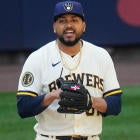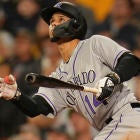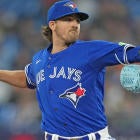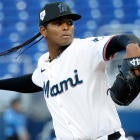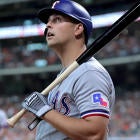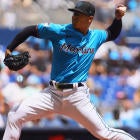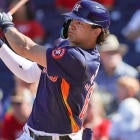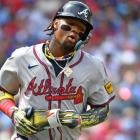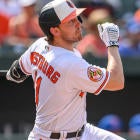Note: Don't whiff on this special FanDuel offer. Win your first contest or get your money back (up to $10) to keep playing. Try FanDuel now!
There are few things we think less about in Fantasy Baseball than defense. For one thing, all but a few leagues completely ignore that third of the game when it comes to Fantasy scoring. Maybe even more importantly, there still seems to be a genuine distrust for the way we measure defensive performance. While I understand that, defense is far from irrelevant, especially for pitchers. The Oakland Athletics pitchers are finding that out the hard way.
For the purpose of this article, I'm going to reference Fangraphs' Defensive Runs Saved (DRS) and Ultimate Zone Rating (UZR). Their names are fairly self-explanatory as far as what they try to measure, but if you'd like more info you should start here.
The Oakland E's?
The Athletics don't have the most errors in baseball, but that's about the only measure in which they don't rank at the bottom of the league. They rank dead last in both UZR (-18.2) and DRS (-23). They've also made the third most errors, with 25. In other words, they aren't covering much ground and when they do get there they aren't making the plays.
Every regular outfielder on the Athletics other than Billy Burns has a negative defensive rating while Danny Valencia and Chris Coghlan both rank amongst the five worst defensive third basemen in baseball so far this year. What effect is this having on the A's pitchers?
Sonny Gray has been one of the most pitch-to-contact aces in baseball over the past two seasons. Since the start of 2014, 13 pitchers have thrown at least 450 innings with an ERA below 3.2. Gray's K/9 ranks 13th. While he has problems of his own this season(namely home runs and walks), the defense is hurting him as well. While Gray has only allowed 1 unearned run, his .328 BABIP against and 63.6 percent strand rate could both be symptoms of a bad defense.
While the defense is affecting Gray, I'm even more concerned about the effect it may have on rookie Sean Manaea. Like Gray, Manaea has given up way too many home runs (30.8 percent HR/FB rate) but his BABIP against (.405) and strand rate (51.4 percent) are both far worse as well. Part of that can be blamed on Manaea, but I worry about the mentality of a young pitcher who seemingly can't "trust his defense."
Now, it's still early and I understand that general distrust of defensive metrics probably leads to major distrust of a little more than a month of defensive metrics. Well, this is much more than a small sample size.
Josh Reddick used to be a good right fielder, but hasn't rated above average since 2013. Coco Crisp is an abomination in center, but playable in left. Unfortunately, left field is reserved for Khris Davis, who has little range and a worse arm. If the team were to move Davis to a full time DH role, it could play Burns and Crisp every day and they could have a league average outfield defense. Davis has played DH nine times this season, but only once in May.
On the infield, fixes are harder to find. As mentioned above, both Valencia and Coghlan are pretty terrible at third base. Jed Lowrie is playing most of his time at second, where he now has 667 career innings with a UZR of -2.3 and a DRS of -5. Marcus Semien is the one plus defender the Athletics have on the infield, and in fairness he made 35 errors last year.
So if you assume the Athletics really are this bad defensively and it's not getting better. What does it mean for the A's pitching staff moving forward?
In 2015 there were ten teams that finished with negatives in both DRS and UZR. Those pitching staffs gave up seven of the 10 worst BABIPs in baseball. Over the past five years, that ratio holds up and the correlation becomes even stronger with teams that were exceptionally bad on defense. Here are the 10 worst defenses of the past five years, along with their BABIP allowed and the league average BABIP allowed.
| Year | Team | DRS | BABIP | LEAGUE BABIP | DIFF |
| 2012 | Rockies | -98 | .325 | .293 | .32 |
| 2013 | Mariners | -97 | .292 | .294 | -.02 |
| 2013 | Phillies | -96 | .306 | .294 | .12 |
| 2015 | Phillies | -92 | .316 | .296 | .20 |
| 2013 | Angels | -72 | .300 | .294 | .06 |
| 2012 | Astros | -72 | .306 | .293 | .13 |
| 2014 | Twins | -69 | .315 | .295 | .20 |
| 2013 | Tigers | -66 | .306 | .294 | .12 |
| 2014 | Indians | -66 | .309 | .295 | .14 |
| 2014 | Tigers | -61 | .312 | .295 | .17 |
Those 10 teams averaged a team BABIP of 14 points higher than league average. The Athletics figure to be on the low end of that spectrum because of their acres of foul territory, but this is a team that's had a team BABIP against of .272 and .289 the past two seasons. They're currently at .311 and I'm not sure how much I expect that to improve.
Now for a pitcher like Rich Hill (or at least who he has been his first seven starts) who averages 11 K/9, BABIP isn't a huge deal. Hill is walking or striking out 40 percent of the batters he faces. If he gets into a jam, he can just strike someone out, in theory. If he maintains this strikeout rate and limits hard contact, I wouldn't worry too much about the comedy routine going on behind him.
As I mentioned above, I'm much more worried about what this will do to Sean Manaea than I am Hill. Manaea's terrible start to his career will have him back on the waiver wire in most leagues, and I wouldn't rush to pick him unless he starts showing considerably more strikeout potential.
For a pitcher like Sonny Gray, nearly 70 percent of the batters he faces put the ball in play. Gray has a career BABIP against of .272, and that mark has been aided by the fact the A's ranked eighth in DRS in both 2014 and 2015. As a pitcher who doesn't strike our many batters, Gray stands to be hurt the most by a significant rise in BABIP. Over the past 10 years only three pitchers have posted an ERA below 3.30 with a BABIP against above .310 and less than 8 K/9.
Gray's 6.00 ERA is a product of many things, the biggest being that he is not pitching well right now. Assuming he's healthy, I fully expect him to figure that out sooner or later. That makes him an interesting buy-low candidate, but the Athletics defense throws a wet blanket on that idea. I've dropped Gray out of my top 30 starting pitchers and wouldn't make any buy-low offers that value him as more than a No. 3 starter for Fantasy purposes.













